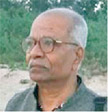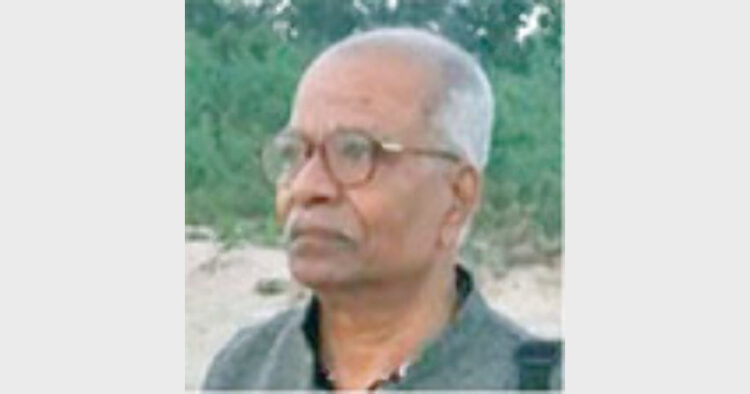 Shashi Tharoor’s Why I am a Hindu promulgates itself in the first person but leaps forward in the political contestation as a distorted and misstated piece of argument
Shashi Tharoor’s Why I am a Hindu promulgates itself in the first person but leaps forward in the political contestation as a distorted and misstated piece of argument
Ramesh Patange
The book called Why I am a Hindu authored by Shashi Tharoor left me totally flabbergasted for at least one reason. Nehruvian Indians have mostly lived in amnesia of their Hindu identity. That Tharoor being one has chosen to speak up not only as a Hindu, but also reasoning for him being the one.
After finishing up the book, I had a lot of questions. The first question which was evident—why it did take decades for Shashi Tharoor to proclaim that he is a Hindu, and he is proud of it? He has lambasted Veer Savarkar and Guruji Golwalkar for their Hindutva philosophy, but it is their courageous and relentless efforts in safeguarding Hindutva that has brought a metamorphosis in Indian polity today that compelled Tharoor to ponder over his Hindu heritage. (Emulating Rajeev Gandhi?)
Section I: My Hinduism
While reading the first section of the book, as a Sangh Swayamsevak, was puzzled if it is Shashi Tharoor or someone from RSS writing? But since book is penned by Tharoor, it carries a special meaning.
The term Hindu cannot be defined. Hindu is not a Semitic religion as it does not have a single book, one prophet, and though Hindus worship idols, personal gods, but they believe in ultimate reality which is formless. Here are some of the quotes from Tharoor’s book, ‘Hindus used to seeing various Hindus pursue their own modes of devotion, found nothing odd in a people with their own different practices, assuming them to be just another kind of Hindu’… (p.34).The author also adds, ‘This pervasive multiplicity of practices and beliefs makes it difficult to conceptualise Hinduism as one with other religions. As a term of description, indeed, ‘Hindu’ implies no monolithic identity; to speak of the Hindu community as one might be the Muslim Ummah is contestable….’ (p.43) It has been added that, ‘Sanatana Dharma, however, saw its adherents engaged in a permanent quest for truth, which was not something revealed from on high by God or a prophet, but something that had to be searched for by prayer, meditation, good conduct and experience…’ (p.47)
The writing style has a knack of cohesion, ease and lucidity, and the tended scholarly treatment doesn’t seem monotonous. Of course, those of us like me, who have read Upanishads, Ramayana, Mahabharata, Shankaracharya, and Vivekananda, will find nothing new in it. Yes, as a senior RSS worker I have read all these materials because my way of life is moulded around them. It is not being said as a feeling of smug.
Harm to Hindus
In the words of Naipaul, Hindu civilisation is a wounded civilisation. Islamic invaders tried to destroy our faith, culture and nation. Shashi Tharoor avoids this agonizing chapter, but elaborates the Hindu response to Islamic philosophy in few pages. The whole bhakti moment was our response to Islamic aggression. Shashi Tharoor writes, ‘The looting of temples and subsequent destruction occurred repeatedly in place ranging from historic Somnath to Mathura.’ (p. 103) He goes on to suggest that ‘renewal was the Hindu response. This renewal occurred through a number of processes—the simplification and propagation of Brahminical doctrines, the adoption of same practices and beliefs from Buddhism and Jainism, the accommodation of popular folklore’ (p. 104)
The advent of the British Raj challenged the Hindu thought and its cultural life. These challenges were met by Raja Ram Mohan Roy, Dayanand Saraswati, Raman Maharishi, Swami Vivekananda, and Sri Aurobindo most remarkably, among others. Of all these illustrious names, Shashi Tharoor has given prominence to Swami Vivekananda who has been quoted highlighting the inclusivity of the Hindu culture, ‘I am proud to belong to a country which has sheltered the persecuted and the refugees of all religions and all countries of the earth.’ (p. 124) Similarly Tharoor has touched upon briefly on Mahatma Gandhi. He writes, ‘The leader who most embodies this approach was Mahatma Gandhi, who called himself a follower of Advaita Vedanta.’
While concluding section one, Tharoor says, ‘As a Hindu, I am proud to lay claim to the legacy of the tradition of thought and action that began with the Vedas and grew under Adi Shankara, flowered through Bhakti, embraced social reformers like Raja Rammohan Roy and Sree Narayana Guru, and has Swami Vivekananda and Mahatma Gandhi as two of its fountainheads.’
Political Hinduism-
Deliberate Mix-up
While talking about political Hindutva, Tharoor commences with Savarkar, a trend followed by the Left at large. He writes ‘Savarkar chose the term Hindutva to describe the quality of being the Hindu in ethnic, cultural and political terms…‘(p. 143). Similarly, he has quoted MS Golwalkar also. For this he has chosen We, or Our Nationhood Defined majorly and also Bunch of Thoughts. We are told that, ‘From Golwalkar onwards, Hindutva was seen as an ideology seeking to establish the hegemony of Hindus, Hindu values and the Hindu way…’ (ibid.)
Savarkar, Guruji Golwalkar and Deendayal Upadhyay have been treated with non-seriousness and Tharoor’s facile analysis shows up! It seems that he attempted a sardonic smile on pragmatic thinkers. This whole rhetoric was nothing new to me. For the last 30 years, or more I have been reading same allegation, same quotation and same arguments. In Marathi there is ocean of such literature.
Let me add a word of clarification with respect that Savarkar is not a philosopher of RSS. We respect Savarkar, we venerate him, but we don’t subscribe to all his views. The philosopher of RSS is Dr Hedgewar whom Tharoor barely discusses and that must be because of ignorance.
Sangh’s definition of Hindu is much wider and it includes all Muslims and Christians. The RSS doctrine is incorporated in nutshell in Sangh’s Prarthana. Tharoor must go through it, wherein he will find the meanings of Dharma and the goal of Sangathan. Sangh is really not book dependent for its functioning and is really like a living society which changes as time demands. We have changed our prayer in 1940, and Bharat Bhakti Strotram was also changed when circumstances demanded it.
Tharoor has quoted a prayer from Haristuti (p.34) which says that Hindus worship all faiths. The same shloka with slight variation has been incorporated as Ekatmata mantra and which is sung by all Swayamsevakas in the Shakhas. Shri Guruji also has quoted same shloka quite often.
It must also be added that We, or Our Nationhood Defined is not our text book. Shashi Tharoor must note that nobody reads it in RSS. There are a number of Muslims and Christian Swayamsevaks in RSS. And they also proclaim their pride in being a Hindu. It is advisable that any author like Tharoor instead of reading outdated books on RSS must go through the resolution passed by Pratinidhi Sabha and the speeches by Balasaheb Deoras and Mohan Bhagvat. Sangh is a saga of progressive enfoldment.
Misstating Deendayal Upadhyay
While discussing Deendayal ji, Tharoor has taken pains to quote Upadhyay on the Constitution of India. While singling out Deendayal ji, he writes, ‘The reverence in which is held by those in power today and the near-felicitation of the man give him an intellectual status within the Hindutva movement second to none.’ Since Deendayal-ji is an icon of BJP, in order to attack BJP, desecration of icon is necessary.
Pandit Deendayal Upadhyay expressed his candid thoughts on the Constitution of India. Tharoor quotes him as ‘We aped the foreigners to such an extent that we failed to see that our inherent national ideals and traditions should be reflected in our Constitution.’ ‘We satisfied ourselves with making a patchwork of theories….’ (p.165) Upadhyay also observed that ,‘Constitution makers were not figures imbued with selflessness and dharma, they were overly in thrall to the turbulent politics of that era, and their minds had been colonized by Western ideas…..’)p. 167). Such observations were made by many leaders across the parties and ideology when the discussions of the draft Constitution was on. Deendayal ji was not an exception. Gandhians like JC Kumarappa also thought that the constitution is un-Gandhian.
During, 1946-50 the Constitution came under heavy criticism from Gandhians. Shriman Narayan has written a book titled ‘Gandhian Constitution for free India.’ He interrogated, ‘The question naturally arises: ‘What kind of constitution shall free India have? Shall we imitate some of the western constitutions like those of Switzerland, the United States or Russia? Or shall we try to evolve a swadeshi constitution based on our national genius, culture and traditions?’ He also added, ‘At a time when Europe and the New World had not even come within the pale of civilisation, India had experimented with monarchy, autocracy, democracy, republicanism and even anarchy.
In his Hindu Policy, KP Jayaswal tells us of the Bhaujya Swarajya, Vairajya Rashtrika, Dvairajya and Arajaka constitutions in ancient India. It has been suggested that, ‘To manufacture for her a mixture of western constitutions, which are yet in the melting pot, will be not only a great insult to India but will also betray gross ignorance of sociological science. For, constitutions are always in the nature of organic growth; it is most unscientific to foist on a country a system of administration foreign to its own genius….’ Thus, to single out Deendayal ji as Tharoor has done is nothing more than political and scholarly knavery.
We must add that Indian constitution with all its limitations, is working fine, and it has protected our national unity. It has created, in real sense, an idea of Bharat. Dr BR Ambedkar is held as the father of the Indian constitution. What he says about the constitution is crucial. He said, ‘People always keep on saying to me, Oh. You are the maker of the constitution.
My answer is, I was a hack. What I was asked to do, I did much against my will….’Justifying his statement on the burning of the constitution Dr Ambedkar told the Parliament: ‘We built a temple for a God to come in and reside, but before the God could be installed, if the Devil has taken the possession of it, what else could we do except destroying the Temple?
We did not intend that it should be occupied by Asuras. We intended it to be occupied by Devas. That is the reason why I said that I would rather like to burn it.’’(The Constitution of India, Role of Dr BR Ambedkar Legend and Reality, p.197)
Tharoor’s book in its first half is not a major issue. Even though it has politically rooted motivations, one can have one’s personalised Hinduism. The trouble lies majorly in the fact that personal has been surfaced to cover the political which becomes apparent in the second section.
The book is marred with deliberate distortions, imposition of self-serving limitations, and most crucially, calculated callous comments on those who have been proud Hindus much before than Tharoor’s realisation of his faith. n













Comments